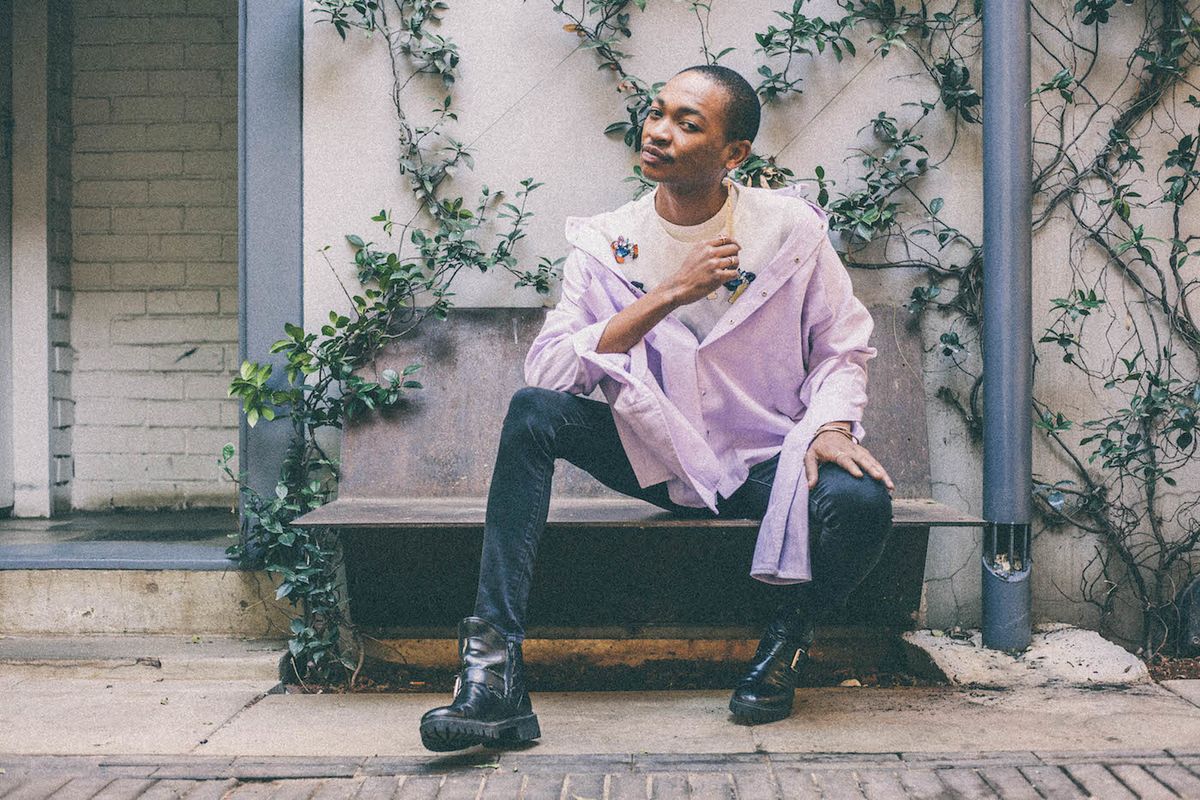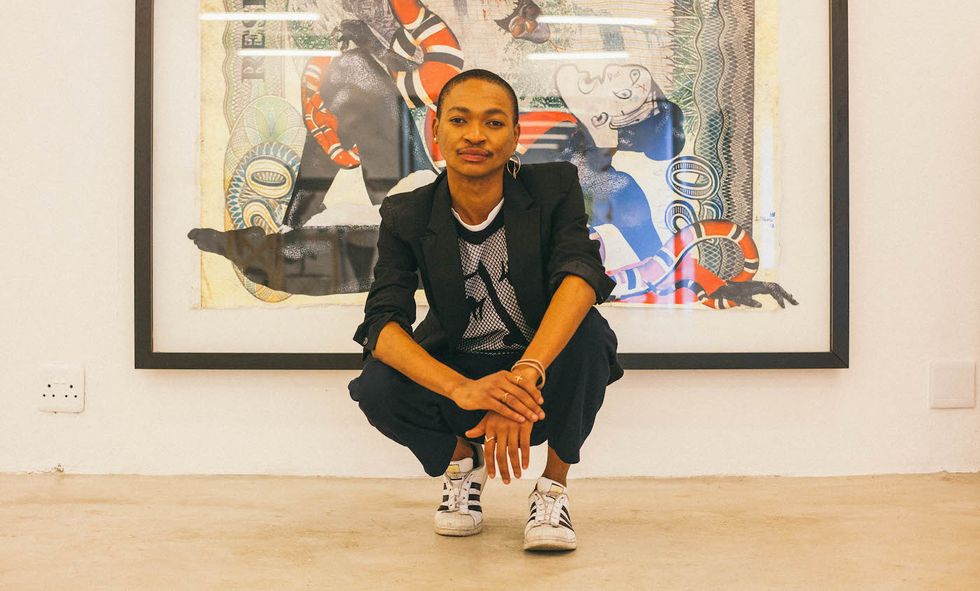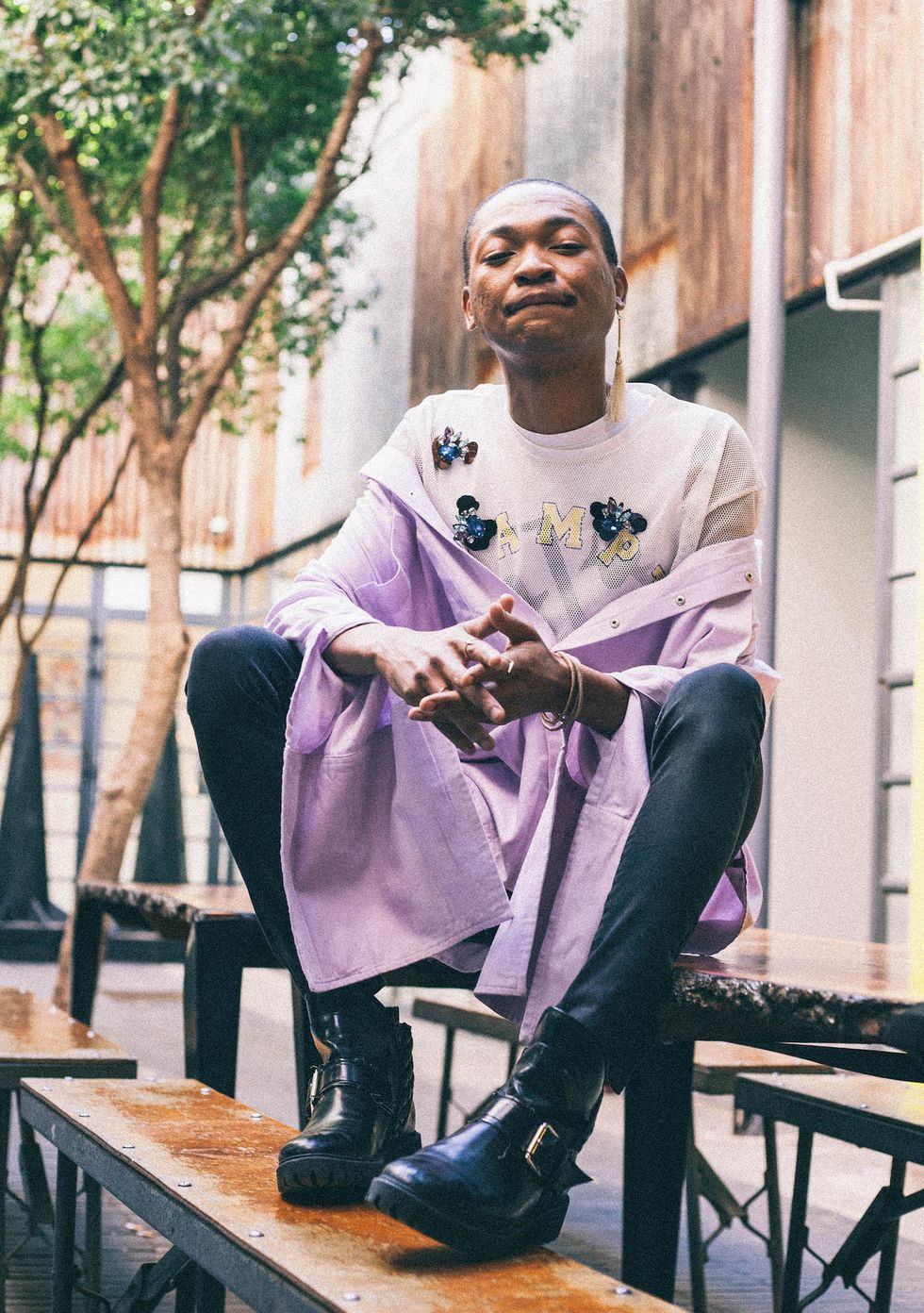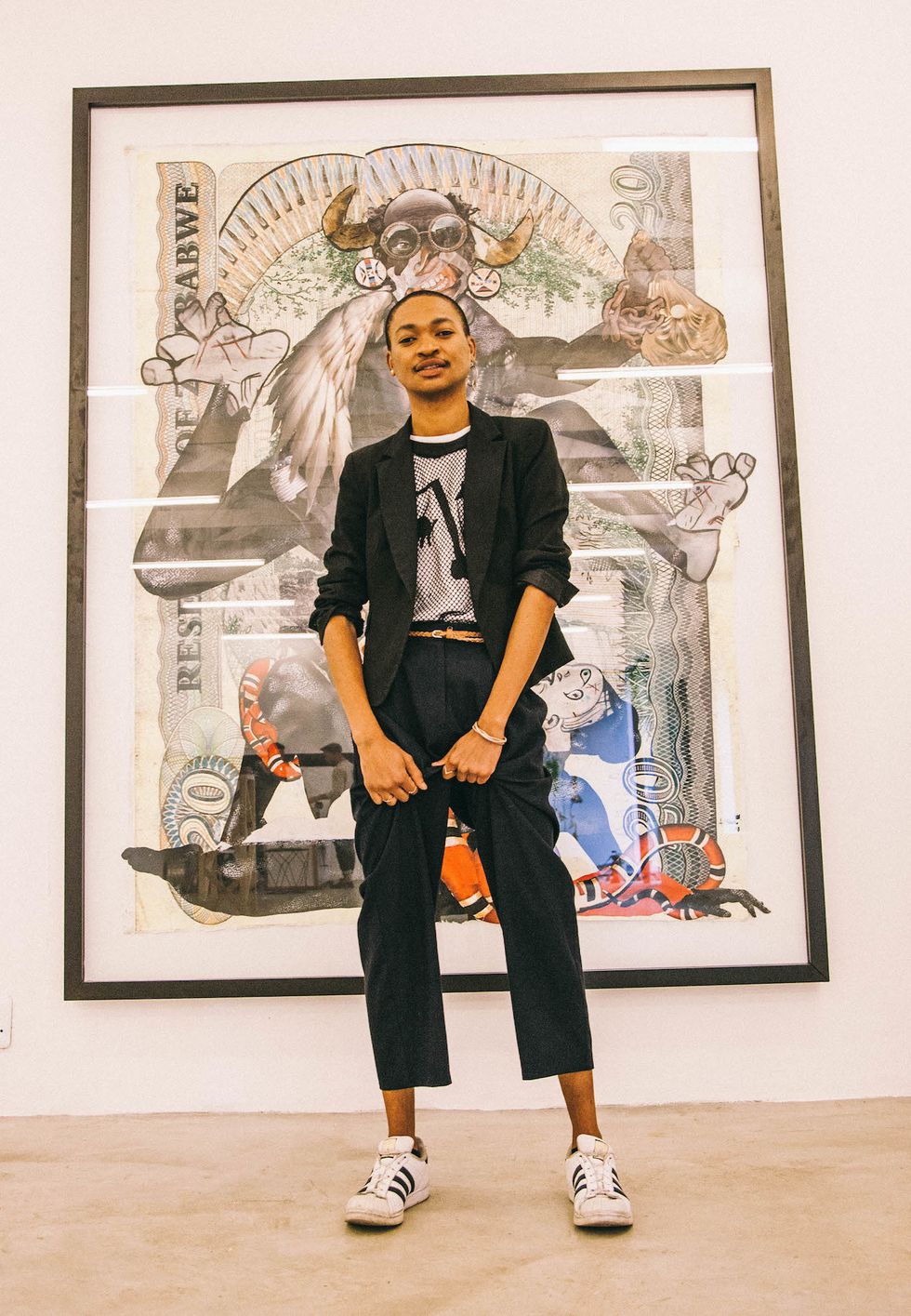Meet Mx Blouse, the Gender-Nonconforming Rapper From South Africa Making Boundless Music
We chat to Mx Blouse about their music and navigating the music industry as a gender-nonconforming artist.

Mx Blouseraps, but they prefer to not box their music as hip-hop. Which makes sense. While on their debut EP, Believe The Bloom (2017), they favored boom bap-inspired production with touches of electronic, their latest single "Is'phukuphuku," fuses kwaito, electro and, of course, hip-hop.
Genre is slowly becoming a thing of the past. And Mx Blouse, just like many artists of their generation—think Stiff Pap, Darkie Fiction, among others—is fusing their influences to make music that reflects their character.
As one of the very few gender-nonconforming rappers out in South Africa at the moment, Mx Blouse offers a new take on hip-hop, a genre known for the masculinity of its practitioners.
When we meet for an interview in Braamfontein in Johannesburg, the artist is all smiles. Their welcoming aura is conducive for a great conversation ahead.
Read our conversation below, in which we discuss how they got into hip-hop, their stint as a journalist, traveling, gender, growing up and if queer is becoming a genre of music, among other things.
How did you get into rap?
It's something that's always been at the back of my mind, something I've always wanted to do. My mom was pretty young; she was only 16 years older than me. My older cousin was eight years younger than my mom. So they kind of hung out, and they were very much into black music. And then my other cousin used to play Tupac and Biggie at home. I was still a kid, but it's just music that sounded good to me. But I only got into hip-hop through listening to The Miseducation of Lauryn Hill. My dad used to live in Durban—my mom and my dad weren't together. So on holidays I used to visit my dad, and he would leave me in the house by myself when he went to work, and that CD was always lying around so I'd play it, and I got into it really hard, and I learned all the raps. Then I started going back into her work with The Fugees. And then I discovered Nas.
So you're a '90s, golden era head?
Yeah, 100%. And then in high school, I went to high school with Senzo, what do you guys call him?Kwesta(laughs). He used to rap a lot at the cyphers, and I'd look at him and think, 'oh, this shit is cool, though.' But I used to just write by myself and not share with people. And after high school, I tried the DJing thing here in Joburg, it didn't work. Because my mom had just died, and it was like, 'this is the amount of money that you have to go to school.' So I was like, 'fuck it, I need to study something that's real.' So I studied journalism, and I actually thought I'd be a journalist for the rest of my life.
And then what happened?
I just became super frustrated.
Did you work as journalist?
I did. I worked in television. I was a current affairs producer at eNCA, and then I worked as an entertainment journalist for The Sowetan. And then that's when I left for Cape Town, 'casue I was frustrated at The Sowetan. I didn't know what I was gonna do in Cape Town. I was writing still. But I was generally having fun there. Eventually the frustration of not knowing what to do with my life drove me into thinking a lot about what I wanted to do, and I came to the conclusion that it's music, so I started pushing—asking people for beats, and people wouldn't give me beats (laughs). Or they'd say, 'come to the studio,' and when I did, people were not picking up phones, it was a lot of that shit. I guess I also hadn't proven myself. And it took getting drunk with Joni Blud this one time (laughs). And I think I started rapping something, and he was like, 'yo, I got some things.' So he sent me a bunch of beats, and it started from there.

Was this when you started recording Believe The Bloom?
So what happened is I had the beats, but I couldn't get into studio, it just eluded me so much. And I remember I did this one big freelance job, and they paid me lots of money. I took that money and went off to Asia. The night before I left for Asia, I was at Kitcheners (a performance venue in Joburg). You know Bhubesii? So I'm there telling him, 'yo man, I've been tryna record this thing, and people are never available,' and he said, 'just use Garage Band.' (Laughs)
So when I got to Asia, I was staying in hostels, and I remember this one hostel, there was no one there but me, so there were all these empty beds.
Where in Asia were you?
It was in Bangkok. I just took the beats and started rapping through my earphones. And I sent the vocals back to Joni, and that's how "WTF (Squared)" happened. And we posted it on SoundCloud. And by the time I get back, Kitcheners is like, 'do you wanna perform here?' I'm like, 'yes.'
How long did you stay in Bangkok?
I went to a couple of places. I was in Bangkok, then I went to Shanghai. In Thailand, I spent about six weeks, and another three weeks in Vietnam.
This was you just seeing the world?
This was me also trying to find myself, because I was just lost and frustrated with everything. I hated my work, and I just needed time out.

So you did the show at Kitcheners?
I did the show at Kitcheners, and from there, I was just making tracks, this was 2016. And someone from Smoking Dragon Festival somehow got hold of my tracks and asked me if I wanted to perform there, so that same New Years Eve, I was playing Smoking Dragon. "WTF (Squared)" was the only track I had out. But because I'd had the beats for so long, I had actual songs, so I was able to perform an actual set. From there, I've just kept going. Thor Rixon is like, 'do you wanna work with me?' and we started working together.
I have a friend of mine who is queer and she raps, and she always tells me how annoying it is to be always labeled a "queer rapper," instead of just a rapper. How do you feel about always having to be labeled as a "gender-nonconforming rapper"?
I don't mind it. But I hope at some point, it's gonna go away. Because it would nice to just be considered an artist, it shouldn't need qualification. But I also recognize how important it is for representation. When I grew up, there were no gay rappers, no trans rappers, like we have now. Even looking at media at that time, there was no one to say, 'oh someone like me can do this.' I think it's important for representation for other people to feel represented in the music industry, or whatever industry it is, so they can say 'I can also do this.'
Have you always been gender-nonconforming?
I think I've always been, without knowing what it is. It was always a feeling of not knowing where to fit in with the boys and the girls.
And I can imagine it was tricky growing up at that time.
It was very tricky. In primary school, there was a year when I would play with the girls, and the boys would call me names. I can't remember how it felt then, I think I just didn't give a fuck really. But then there came another time when I stopped playing with the girls, and went to play with the girls, they all clapped for me. (Laughs) On some 'welcome back.'
And being a hip-hop head or fan, hearing how homophobic and intolerant rap can be, how did you deal with that? How did you listen to music that hates you so much?
Going through an identity crisis, the way most LGBTI people do, you learn to shut other things out. And I think I managed to shut myself out of hip-hop for a very long time. I was still listening to it, but I wasn't participating in the culture. So much so things like battle-rapping, and cyphers are not things I've participated in, in any capacity. And I think that's why, for me right now, it's more about making music, rather than trying to fit into hip-hop per se. I rap, but I don't know if I can call my music hip-hop.
What do you make of—I will say in South Africa because that's what I know—there is a queer music scene here. And I know where it comes from—there's a need to highlight a disadvantaged group of people, it happens with women artists and with black artists, too. But it's getting to a point where 'queer' is like a genre of music. What do you make of that?
I don't know what it is. I think at the end of the day, it's up to promoters. Promoters kind of push that thing as well. I remember at Smoking Dragon, I was lucky to end up performing on a "normal" stage. But I was scheduled for the LGBTI stage.
There was an LGBTI stage?
Yes. Like most festivals do actually. And my question the whole time was, 'you are trying to be inclusive, but you are actually segregating the whole thing.'

It's tricky.
But luckily, something (I don't know what) happened on the LGBTI stage, and I ended up performing on the "normal stage." Whatever "normal" means. (Laughs) So hopefully, things will change where people are looking at queer artists as just artists. Like, I always freak out when people try to put me in the same category as FAKA. I'm like, 'we are not even making the same music.' But queer is not a genre. You can't just bunch us all up because we happen to be queer.
With your first EP, you had that boom bap vibe going, but it wasn't just that. And your new single is something completely different. Was that an intentional thing?
No, not really. There's a track I've been working on with Parable, and it's got an Aphex Twin sample. For some reason that sample just reminded me of TKZee. It doesn't really sound like TKZee, but it gave me that nostalgic feeling. So I started rapping on it. I had never used as much vernacular on a track as I did on it. And that's when I decided I wanted to explore this route. So I told Thor this is the direction I sort of wanna get into it.
How did you meet Jakinda, who produced your latest single "Is'phukuphuku"?
I think we just connected online, but not in terms of working, we just followed each other on social media. But when I went to Cape Town earlier this year, I was scheduled to go on studio with Thor Rixon, and on Wednesday night, I ran into Jakinda at The Waiting Room, and we started chatting. He told me he's going into studio with Thor the next day. So I was like, 'let me rather go with you, instead of going on Friday.' And then we all ended up in studio, and we did the things.
The video for "Is'phukuphuku," I picked up that you shot it in a low-end mall or shopping center. You even went into that salon. It's not a space one would expect a rap video to be shot. Was that the idea behind the video?
So Jarred came up with all of that. My brief to Jarred Figgins (the video's director) was I just want a simple video with different kinds of bodies—queer people, straight people, women, men, genre non-conforming people. And the idea was to be in spaces where we don't fit. So I said to him, 'maybe we can go into a shop, buy some gatsbies and then walk down the street, go to a party at Corner Store or something.' But he came up with the concept.
Was this in Joburg?
It was in Cape Town.
Where in Cape Town? It sure does look like Joburg.
I actually can't remember. The mall is the Grand Parade. And then I can't really remember where that other shop towards the end was. The idea was to kinda make it look Joburg. I told him I didn't want the mountain in there. It's the whole idea of being queer, and being hyper visible and invisible at the same time.
What are you working towards?
I've learned that visuals are very important. I don't have plans to drop an album. But I'm planning to follow up every single I drop with visuals, be it a video, images or even a short film.
As an artist what will make you feel like you've arrived? Is it getting played on radio or performing at particular festivals?
I hope I never get to feel that way because it would kind of discourage me. I hope to always feel like I need to do more and better. But with that said, I'd love for "Is'phukuphuku" to be on radio. I'm trying, but getting a single on radio in South Africa is so difficult.
Almost impossible actually.
It's almost impossible. Even with campus radio, I'm struggling. Shooting a video was also part of that—getting the music out because I realized having tried to put music on radio and it's very difficult. So my best bet is to try and make it pop on social media. And use my connects in the media to put it out and see where it takes me.
Follow Mx Blouse on Twitter, Instagram, Facebook and SoundCloud.
All images taken at Kalashnikov Gallery in Braamfontein, Johannesburg.
- Interview: Mx Blouse Pushes the Boundaries of Kwaito on Debut Album ‘Elementality’ - OkayAfrica ›
- The Fugees Will Be Playing Live Concerts In Ghana & Nigeria - OkayAfrica ›
- The Fugees Concerts In Ghana & Nigeria Have Been Postponed - OkayAfrica ›
- The Fugees' Concerts In Ghana & Nigeria Have Been Cancelled - OkayAfrica ›

